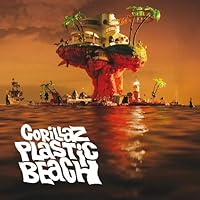
Average Reviews:

(More customer reviews)"Empire Ants" starts off like the nice-but-boring ballads from the last Blur album. Then it suddenly explodes into a dazzling rush of impossibly clean keyboards and Yukimi Nagano's lost, spaced-out vocals. It is an incredible, beautiful contrast with Damon Albarn's conventional balladeering in the beginning.
Ultimately, Plastic Beach isn't as visionary as Demon Days (surely one of the top five albums of the 2000s), but when it does come together, there's nothing else like it. The album's other peak is the lead single "Stylo," which unsurprisingly bears the most resemblance to the dark mood of Demon Days. It's packed with even more brilliant left-field juxtapositions than "Feel Good Inc." The music is based on a cold pinpoint-techno crawl with dark keyboard overlays. The lead vocal is passed from a smooth vocoded rap by Mos Def, to Albarn's fragile lost soul (much like in "Feel Good Inc."), to a colossal, histrionic turn by soul legend Bobby Womack. The smooth, easy way with which these three very different vocal styles alternate is remarkable, and the first two vocalists create a restrained counterpoint to Womack's overpowering, force-of-nature voice.
Alas, "Stylo" is the only time Plastic Beach flirts with darkness. The other catchy pop moments are of a more comic, whimsical nature. "Superfast Jellyfish" has De La Soul on lead vocals, but it's really a classicist British pop song masquerading as hip-hop. It has more in common with catchy, fey Blur songs like "For Tomorrow" and "Charmless Man" (and with predecessors like the Kinks) than with rap or electronic music. I predict that it will be massively popular in Britain, but I personally prefer the more dramatic tone of Demon Days.
Albarn produces the album himself this time, and it shows. Aside from the one brilliant moment in "Empire Ants," there are no sudden, abrupt shifts like the crashing rap verse in "Dirty Harry" or the move from keyboards to acoustic guitar to strings in "Last Living Souls." That was a large part of what made Demon Days so captivating -- you never knew what was coming next, even over the course of one song. Plastic Beach is less unpredictable.
Furthermore, Albarn's background in Britpop leads him to make less effective use of the rappers than previous producer Danger Mouse. On "White Flag," Albarn tries to create an unconventional Gorillaz juxtaposition by putting a string and woodwind section together with rapping. Unfortunately, instead of flowing together seamlessly like "Dirty Harry," it sounds really jarring. I think Kano and Bashy have an awkward flow, especially when compared to the effortless way in which Bootie Brown dominated a much more complex rhythm-and-strings combination on Demon Days. Additionally, "Sweepstakes" is a very ungainly and repetitive song (unfortunately much longer than "White Light") -- Mos Def basically yells a few lines over and over, a far cry from his own performance in "Stylo."
The huge number of collaborations on Plastic Beach means less than the sum of its parts. What's the point of getting Mark E. Smith on your album if you only have him sing a couple of lines? "Glitter Freeze" may have Smith's name on it, but it's basically an instrumental -- a good one, but you'd expect more. "Superfast Jellyfish" has Gruff Rhys on the chorus, but he sounds completely identical to Albarn. The title track features Mick Jones and Paul Simonon of the Clash, but there's nothing about it that really stands out from any other Gorillaz song. If Jones is participating in the vocals, I couldn't tell him from Albarn either.
On the plus side, "Some Kind Of Nature" features a hugely appealing performance by Lou Reed. His bemused affectations, together with the music-hall backing, make him sound like a more gravelly-voiced version of Bowie. The positive tone is really infectious, and Albarn provides a bit of creeping melancholy in the chorus. Furthermore, Snoop Dogg is the perfect choice for "Welcome To The World Of The Plastic Beach." His extremely lazy, luxuriant style is an ideal match for the tropical-resort image of the "plastic beach," and he offers a generally positive message, but his voice always has this sleazy, threatening undercurrent that is also perfect for Albarn's vision of "plastic" debris. The glitzy, chintzy horns blaring throughout the track are a great touch, creating a seductively futuristic, extravagant sound.
Also, Albarn always has Britpop balladry to fall back on. He finds two gems in this vein: "Rhinestone Eyes," where woozy synth-funk combines with his detached speak-singing (surprisingly poignant when it leans toward singing at the end of a line), and the gently rolling "On Melancholy Hill." Other songs like "Broken" cover the same emotional territory, but "Rhinestone Eyes" is by far the best.
I think we all wanted this to be the ultimate globe-trotting, ultra-hip, futuristic album. Actually, Plastic Beach is more like The Great Escape to Demon Days' Parklife. It has more pop, more hooks, more collaborations, more everything, and sometimes it's even better, but still, it was Demon Days that really nailed the mood of the decade. Plastic Beach doesn't have the same effect, but it has moments of brilliant inspiration.
Click Here to see more reviews about: Plastic Beach
Five years on from the release of Demon Days, Murdoc Niccals and co. return with Plastic Beach. The band have taken up residence, recording on a secret floating island deep in the South Pacific, a Plastic Beach HQ, made up of the detritus, debris and washed up remnants of humanity. This Plastic Beach is the furthest point from any landmass on Earth; the most deserted spot on the planet.
The world s biggest animated band, Gorillaz formed in 1998, and have since sold 12 million copies over two albums Gorillaz (2000) and Demon Days (2005). They have hit number 1 in more than a dozen countries and picked up awards including Grammys, Novellos, VMAs and EMAs.
Plastic Beach is produced by Gorillaz.

0 comments:
Post a Comment